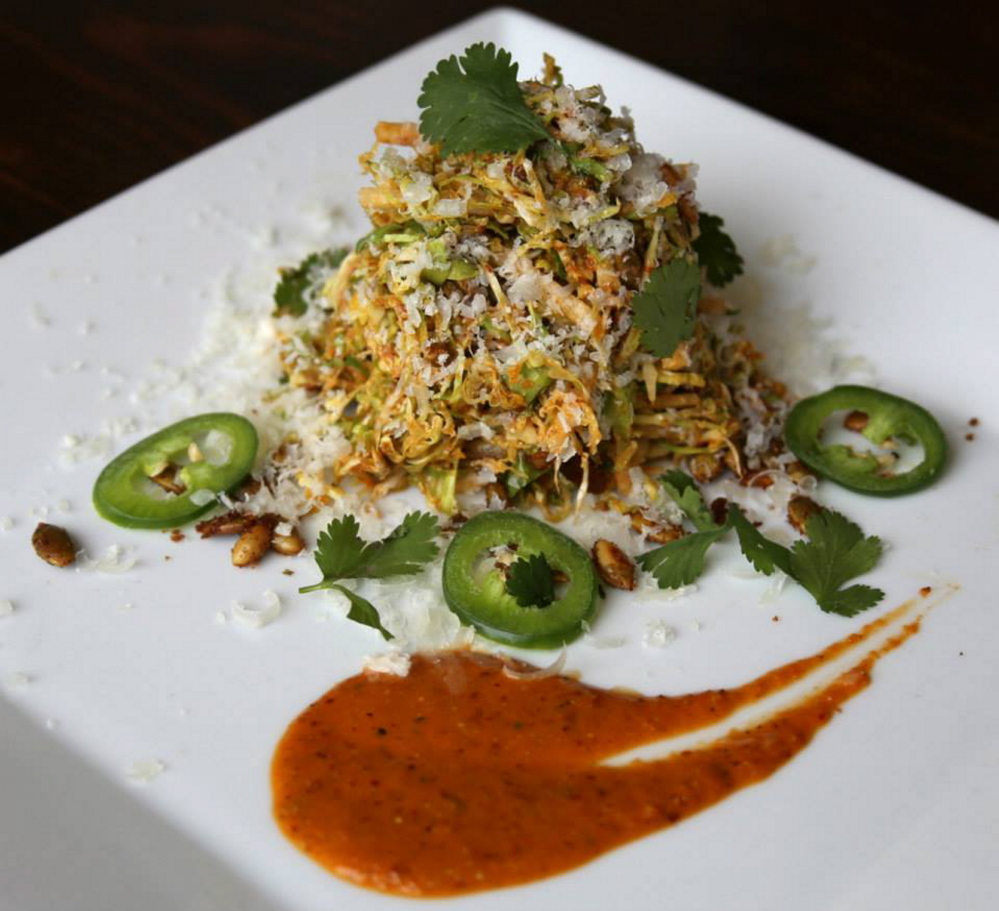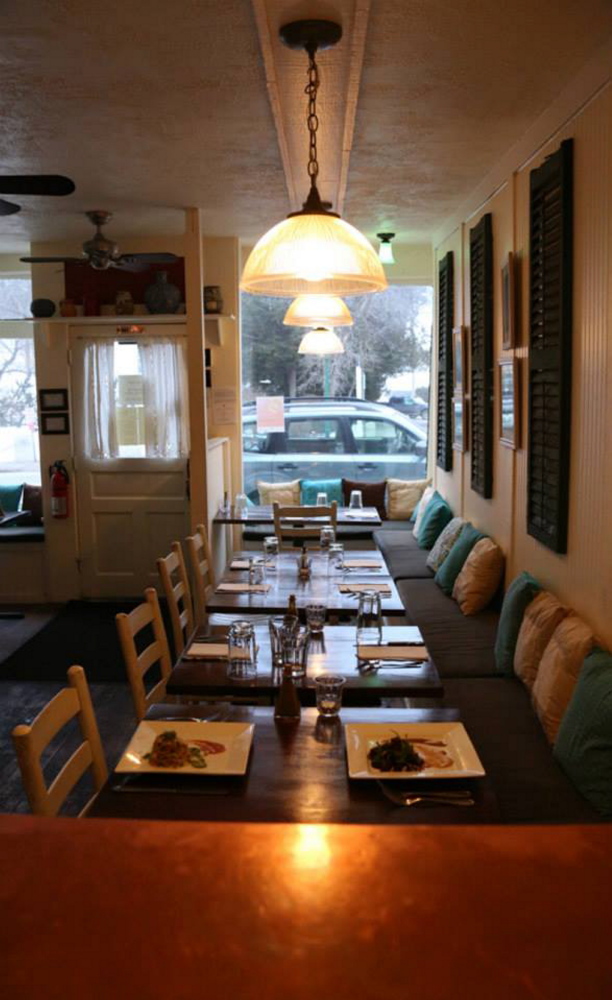“I have a saying about Cuba: ‘Never look in the pillows and don’t eat the cake’ – you never know what’s in either,” my dinner guest tells me with a chuckle. We’re tucked into a window seat at Comida Latin Kitchen, located in a shingled house and patio that looks across Camden’s Elm Street to the Village Green and harbor beyond.
My guest is one of Maine’s few Cubans and only presidential inaugural poet, Richard Blanco. I’ve asked him to provide perspective on Comida’s Latin fusion menu, which the website says is inspired by Cuban and Spanish foods, as well as those of Mexico and Central and South America. I’m curious to see if he finds the dishes similar to native foods of the same name, or a uniquely Mainiac version of Latin staples.
“I don’t remember any of my relatives ever drinking mojitos,” Richard says when I order Comida’s version with pineapple and cilantro. “They were invented in Cuba, but I think it’s more of a tourist thing from the 1950s that was revived in Miami.” He gets vodka on the rocks instead. Tourist that I am, I find the mojito with its sugared rim tasty and cool on a warm summer evening without air conditioning.
Not a Spanish speaker myself, it’s helpful to have Richard here to make quick selections from the Spanish-titled menu without having to read the English descriptions beneath. We start with the Tostada de Cerdo ($10), a delicious toasted corn tortilla with salsa verde and pink pickled onions over pulled pork mixed with black beans.
We’re both hungry and find the tostadas are satisfying and work well with our salads, which are fresh and enjoyable. Mine is the Ensalada con Coles de Bruselas ($9) with shaved Brussels sprouts, cilantro, daikon radish and manchego, a Spanish sheep cheese, and a not-too-spicy guajillo chili vinaigrette. The dressing makes normally bitter Brussels sprouts into a much sweeter version of themselves.
Richard chose the Ensalada de Romaine Rojo y Chorizo ($8), as he’s a big fan of the traditional sausage. The chorizo has been cut into tiny squares that are spicy and hard, and a good mix with the fresh spears of red romaine lettuce leaves, goat cheese and buttermilk vinaigrette.
“This is probably much healthier than Cuban food,” Richard says. “It’s certainly not as fried as Cuban food is traditionally.”
Richard reminisces about his favorite Cuban dishes, tops being ropa vieja, which translates roughly to mean “old clothes,” in reference to the rumpled look of the shredded beef. There’s no ropa vieja on the menu here, but there are croquetas, which were a popular snack that his mother would make with leftover chicken, pork or fish.
The Carne de Res y Croquetas ($23) here are filled with poblano peppers and cheddar and sided by marinated steak and a mound of sautéed collard greens that appear to be mostly kale, with a smear of cilantro pesto beneath. My order of Pollo Barbacoa ($19) consists of chunks of oven-roasted chicken over collard greens, topped with a tangy barbecue sauce, almond silvers and cilantro.
The steak and chicken are both tender and flavorful, though the generous quantity of collard greens and kale that come with both remind me of how health food used to taste – the emphasis more on the “health” than the “food.” These days healthy food simply tastes good. While I’m grateful for the large doses of calcium and fiber I’m getting from the greens, I’m wishing they could be prepared with a lighter touch.
Richard tells me about his memoir, “The Prince of los Cocuyos,” due out next month, and says that when he was growing up in Miami his parents and grandparents used to speak with longing about how much better the food was in Cuba. It wasn’t until he traveled there as a teenager that he discovered what they meant. “The food people eat in their homes in Cuba is farm-to-table by necessity, though they don’t use that term,” he says. “You want pork, you have to raise a pig, and the corn for tortillas is grown in the neighboring field. It all tasted so much fresher than the American versions I’d grown up on, even from the traditional Cuban kitchens of Miami.”
Comida Latin Kitchen is striving to reproduce such Old Country farm-to-table food made from scratch using Maine’s plentiful local meats and vegetables. The space even has that quaint local-restaurant feeling I loved when traveling in Baja, with the bathroom accessed through the kitchen. The difference is that for many people in Cuba and South and Central American countries, a meal is a reward to be earned every day. And basic things like flour for cake cannot be taken for granted. Not to mention what’s in the pillows.
At Comida Latin Kitchen, as we are accustomed in America, there are no such deprivations. The pillows surrounding the window seat are soft and comfortable to sink into after dinner. As well, there’s no shortage of flour for the bread pudding we get for dessert, though it is a heartier version of standard bread pudding – as if it’s made from the heavier whole-wheat bread I remember as a back-to-the-land kid.
Richard agrees that these are certainly Latin foods inspired by their originals, with what might be called a Maine healthy twist. Since health food evokes the childhood nostalgia for me that Cuban food does for Richard, I’m not complaining here, just laughing to myself and Richard, and looking forward to the internal cleansing such fiber and roughage is known to provide.
Also, I also can’t help but wonder if chef Tom Sigler’s dad once had a full beard and ponytail down his back?
Melissa Coleman is interim restaurant reviewer for the Maine Sunday Telegram. Coleman writes for national and local publications and can be found at melissacoleman.com. Her memoir, “This Life Is in Your Hands: One Dream, Sixty Acres, and a Family’s Heartbreak,” is about coming of age during the 1970s back-to-the-land movement.
Send questions/comments to the editors.




Success. Please wait for the page to reload. If the page does not reload within 5 seconds, please refresh the page.
Enter your email and password to access comments.
Hi, to comment on stories you must . This profile is in addition to your subscription and website login.
Already have a commenting profile? .
Invalid username/password.
Please check your email to confirm and complete your registration.
Only subscribers are eligible to post comments. Please subscribe or login first for digital access. Here’s why.
Use the form below to reset your password. When you've submitted your account email, we will send an email with a reset code.